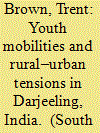| Srl | Item |
| 1 |
ID:
139564


|
|
|
|
|
| Summary/Abstract |
This article explores the relationship between the sent-down youth movement and economic development in rural China during the Cultural Revolution. It examines ways in which sent-down youth themselves initiated improvements in rural life, and more importantly, how local officials used both their presence to acquire equipment and technical training and their skills and education to promote rural industry. The sent-down youth offices established in the cities and the countryside inadvertently provided connections between remote rural counties and large urban centres that enabled the transfer of a significant quantity of material goods, ranging from electrical wires and broadcast cables to tractors and factory machinery. Ultimately, we show how individual sent-down youths, their families, and both urban and rural officials – none of whom had a role in determining government policies – identified and made use of resources that those policies unintentionally produced.
|
|
|
|
|
|
|
|
|
|
|
|
|
|
|
|
| 2 |
ID:
139468


|
|
|
|
|
| Summary/Abstract |
Globalisation has introduced new sources of mobility for India's youth, yet not all youth experience mobility in the same way. The unevenness of mobility trajectories is especially visible in regional towns, where poor rural migrants and more globally connected middle-class youth occupy the same social space. To illustrate these mobility trends, this paper presents the stories of youths from various backgrounds in the town of Darjeeling, exploring different sources of mobility for rural and urban youth. While rural youth experience some forms of upward mobility as they migrate into the town, urban youth are confronted with downward mobility and are frustrated in their aspirations for professional careers and ‘modern’ lifestyles. For aspiring urban youth, upwardly-mobile rural people are seen as a threat to their privilege, blocking their mobility aspirations. This is contributing towards emerging tensions between rural and urban populations within the town.
|
|
|
|
|
|
|
|
|
|
|
|
|
|
|
|